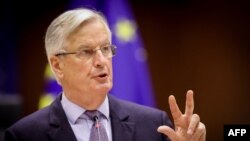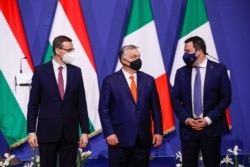Former top European Union official Michel Barnier, who led the bloc’s fraught Brexit negotiations, says immigration to France should stop for three to five years and the Schengen system of free movement between member states needs reexamination.
The French politician, who according to some French media outlets is considering challenging Emmanuel Macron in next year’s presidential election, says immigration in the EU is “not working” and that the bloc’s external borders have become a “sieve.”
His remarks, made to a French television station Tuesday, are likely to be seized on by nationalist populists in central and southern European countries that have been increasingly critical of the Schengen system of free movement between member states on the grounds that the bloc’s external borders are porous.
The former French foreign minister told France Television, “I try to look at the problems as they are, in the way the French people live them every day and to find solutions and I think that effectively we need to take some time over three to five years and suspend immigration.”
He added: “I’m not talking about students, I’m not talking about refugees who must be treated with humanity and strength, but we need to rebuild the whole process. We need to talk to our neighbors, about the Schengen Agreement, we possibly need to put in stricter border controls.”
He said that it might be necessary to renegotiate Schengen rules and reintroduce cross-border controls for EU citizens.
Central European populist leaders, such as Hungarian Prime Minister Viktor Orban, have long railed against Schengen, arguing that the absence of strict enforcement of the EU’s external borders has been facilitating a migration crisis.
Orban and other Central European populists have declined to participate in EU migrant-burden sharing plan for asylum seekers, largely from the Middle East and sub-Saharan Africa, who have landed on the coasts of southern Europe to be redistributed across the bloc.
“If you are willing to repatriate immigrants, we will try to help with repatriation,” Orban said at one summit. “Shared distribution, not. Shared repatriation would be very good.” He rejected the idea migration can lead to cultural enrichment, arguing integration fails and warned migration brings “public safety problems.”
Barnier, in his Tuesday comments, also touched on security concerns, saying there are “links” between immigration and “terrorist networks that infiltrate migrational flows.” He cited human trafficking as a major concern, too.
The end of bordless travel?
The free movement Schengen zone is seen by Europhiles and those backing deeper EU political and economic integration as crucial. European Commission President Ursula von der Leyen has argued that the bloc’s “linchpin” is a “fully functioning Schengen.”
Barnier, too, was a strong advocate of Schengen and during Brexit negotiations he emphasized that the single market’s “four freedoms” — free movement of goods, capital and people and the freedom to establish and provide services — are indivisible. “Cherry picking is not an option,” he warned at the start of Brexit negotiations in 2016.
His remarks Tuesday prompted lively tweets with the chief foreign correspondent of Britain’s Financial Times noting a Brexit “irony.” “If the EU had allowed much milder restrictions on free movement of people, Brexit would probably never have happened,” he noted. Some commentators suggested French presidential ambitions may be behind Barnier’s skepticism about Schengen.
Since leaving the EU bureaucracy in February, the 70-year-old Barnier, a former EU commissioner, has leveled a string of criticisms on how the bloc is functioning and has published a diary of his time as the chief Brexit negotiator. While highly critical of the British government and Britain’s decision to relinquish EU membership, he has warned that, although an “unlikely event,” other member states could decide to quit, saying, “less bureaucracy, more democracy” is needed in Brussels.
Last week, he told another French channel, “In Brussels and Paris alike, it is urgent that we demonstrate the added value of the European project. Maybe — and it’s a suggestion I’m making for the upcoming French presidency next year — there will be a need to assess each European competency and policy to see which ones still have an added value and which ones don’t have that anymore. Where competencies ought to be given back to states.”
British politician Nigel Farage, a key Brexit figure, joked in response on Twitter that Barnier, who for years has been seen as a europhile hero, is becoming a “euroskeptic.”
EU member states broke with Brussels last year over border controls, which they imposed unilaterally because of the pandemic. EU officials told national governments that they shouldn’t close borders or stop the free movement of people within the Schengen zone without group agreement. They were ignored.
Some politicians argued last year that the Schengen system of borderless travel may never be fully restored after the coronavirus has been suppressed or run its course. Luca Zaia, governor of the Veneto region, one of Italy’s worst-hit areas, told reporters last year that Europe’s borderless zone was “disappearing as we speak. Schengen no longer exists,” he said. “It will be remembered only in the history books,” he predicted.









